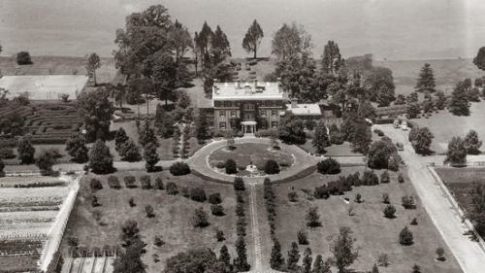– This Is The Russian “Retreat” In Maryland Which The US Government Just Confiscated:
As reported earlier today, amid the sweeping sanctions unveiled by Obama in response to Russian “hacking” of the elections, President Obama ordered the shut down, or rather confiscation, of a Russian-owned compound on Maryland’s Eastern Shore. Obama gave Russia 72 hours to leave the 45-acre property, which the Soviet government bought in 1972.
Live video shot from NBC Washington on Thursday afternoon showed multiple unmarked cars on the perimeter of the property. Officials appeared to set up an antenna and lights at each entrance. Intelligence officials tell NBC News the property was used for work to monitor the National Security Agency (NSA) headquarters in Fort Meade, Maryland, and another NSA building on Kent Island.
In what amounted to the strongest retaliation against Russia by the U.S. in decades, the administration also sanctioned two Russian intelligence services as well three companies officials said aided them, while expelling 35 diplomats. The administration also denied access to a recreational compound in Queen Anne’s County that officials said had been used for “intelligence collection activities.”
Why the focus on the Maryland compound? Here is a brief history of the property in question, courtesy of Baltimore Sun.
The 45-acre site on the Eastern Shore waterfront near Centreville was purchased by the Soviet Union in 1972, a State Department official said. Its ownership was not a secret — it has been widely covered by news organizations for decades — and Russian officials have previously said the site has been used as a retreat for diplomats and their families.
Property records show that the Russian government owns two parcels of land on Town Point Lane, about five miles west of Centreville, near where the Chester River meets the Corsica River. One parcel of 45.52 acres is valued at about $8 million for tax purposes, while the other is just shy of an acre and is valued at $537,200.
Both were transferred from the Soviet government to the Russian Federation in 1995, according to property records.
The U.S. Department of State also owns a 4-acre property on Town Point Lane. It has a 6,845-square-foot office building built in 1960, according to property records.
A spokesman at the Russian Embassy in Washington did not immediately respond to a request for comment about the Maryland property. In Moscow, a spokesman for Russian President Vladimir Putin told the Associated Press that the Kremlin regrets the new U.S. sanctions and will consider retaliatory measures.
* * *
Below, is a 1992 report from AP on the Russian Federation’s takeover of the Maryland Vacation retreat which 24 year later was repossessed by the US:
Russian Federation Takes Over Maryland Vacation Retreat
While turmoil and bloodshed surrounded the breakup of the Soviet Union, a vacation retreat in Maryland became the property of the the Russian Federation.
”It was bought by the former Soviet Union,” said Ivan Rumyantsev, a spokesman for the Russian Embassy in Washington.
There are no plans to sell the 45-acre estate, valued at $3 million, said Rumyantsev. It occupies prime property on the banks of the Corsica River, two miles outside Centreville, on Maryland’s Eastern Shore.
It was purchased by the Soviet Union in 1972 as a vacation getaway for diplomats and their families.
The fenced compound is the former estate of John J. Raskob, who was the chief aide to Pierre S. du Pont, board chairman and president of the Du Pont Co. in the early 1900s.
Raskob’s brick mansion has been renovated into about 12 apartments. There also are a dozen cottages each with four apartments. The compound can accommodate 40 families, each of whom pay a small fee used for maintenance.
The retreat has four lighted tennis courts, a swimming pool and soccer field. The Russians conduct a camp for diplomats’ children for three months in the summer and two weeks at Christmas.
Not many families visit during the winter, but those who do usually go for fishing and fresh air, Rumyantsev said.
”My family usually goes during the spring and fall when it’s not too hot,” he said.
Centreville residents were curious, but not overly concerned about whether their Russian neighbors would still be around following the breakup of the Soviet Union. Locals said the diplomats are just regular folks, even if they don’t all speak English or at least appear not to know the language.
”I live down the road from them. We fish and crab with them. There’s usually one that speaks English for the group,” said Bonnie Delph, who works in the meat department at the Acme supermarket.
When it comes to fixing Maryland steamed crabs, she said, the Russians do it a little differently than the locals, who throw the live crabs in a pot of boiling water.
”They stab them with a screw driver, break the back shell off, clean them and then boil the body,” she said.
Rumyantsev had nothing bad to say about Centreville.
”They are ordinary Americans. They have work to do and they are quite polite,” he said. ”And the city is an example of a small American town with a Main Street. It’s a good example of how people live, not like a New York or a Chicago.”
